On balance, Americans say the free public expression of opinions both for and against Israeli and Palestinian statehood should be allowed. But most draw the line at calls for violence against Jews or Muslims, which the vast majority say should not be allowed.
The survey asked respondents whether they think people in the U.S. should be allowed to publicly express each of the following types of speech, even if doing so might offend others:
- Support for Israel’s right to exist as a Jewish state
- Opposition to Israel’s right to exist as a Jewish state
- Support for Palestinians having their own state
- Opposition to Palestinians having their own state
The survey asked respondents to answer these questions regardless of their own views.
Seven-in-ten Americans say that speech supporting Israel’s right to exist as a Jewish state should be allowed. Two-thirds say the same about speech that supports Palestinians having their own state. In both cases, only about one-in-ten U.S. adults or fewer say these kinds of speech should not be allowed, though many more are unsure.
Smaller majorities say speech that opposes Palestinians having their own state (61%) or Israel’s right to exist as a Jewish state (58%) should be allowed. Fewer than one-fifth of U.S. adults say speech opposing Palestinian statehood (13%) or Israel’s existence as a Jewish state (17%) should not be allowed; around a quarter are unsure on these questions.
When we analyze various combinations of responses, we find that:
- Most Americans who say that speech supporting Israel’s right to exist as a Jewish state should be allowed also say that speech opposing Israel’s existence should be allowed; 57% of respondents say both should be allowed.
- Likewise, most who say it should be allowed to publicly support Palestinians having their own state also say it should be allowed to publicly oppose Palestinian statehood; 58% say both should be allowed.
- An even larger share of Americans (63%) think that speech supporting both Palestinian statehood and Israel’s right to exist as a Jewish state should be allowed, while 55% say that speech opposing both should be allowed.
Views on these issues often vary by religion, age, education and other demographic factors.
Religion
Most White evangelical Protestants, White Protestants who are not evangelical, White Catholics, Jewish Americans and religiously unaffiliated Americans (those who describe themselves as atheists, agnostics or “nothing in particular”) are broadly in favor of people being able to publicly express either support or opposition to Israeli and Palestinian statehood.
Black Protestants, Hispanic Protestants, Hispanic Catholics and Muslim Americans are less likely to say people should be allowed to voice these views, though these religious groups have a notably higher tendency to express uncertainty on the issue. For example, 33% of Muslims surveyed say they are not sure whether people in the U.S. should be allowed to express opposition to Israel’s right to exist as a Jewish state; about half of Muslims say this kind of speech should be allowed, and 18% say it should not be allowed.
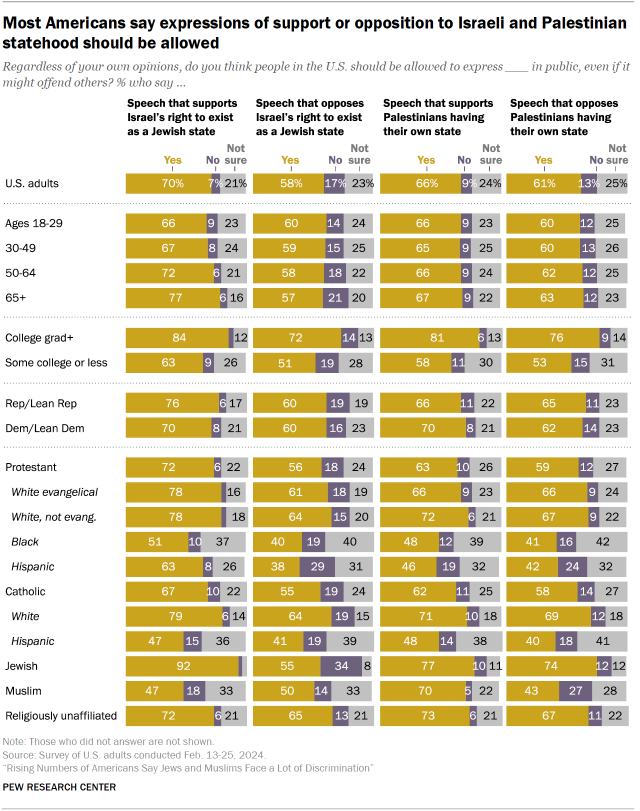
Education
Views about which kinds of speech are acceptable are tied to education. Americans who have at least a college degree are far more likely than those with less education to say that speech supporting or opposing Israel’s right to exist as a Jewish state, as well as speech supporting or opposing Palestinians having their own state, should be allowed.
Those with some college or less education are more likely than those with at least a college degree to say they are unsure whether speech like this should be allowed.
Age
Most U.S. adults, regardless of age, support the free expression of opinions about Israeli and Palestinian statehood, though Americans ages 50 and older are somewhat more likely than adults under 50 to say people should be able to publicly express support for Israel’s right to exist as a Jewish state (74% vs. 67%).
Speech about violence
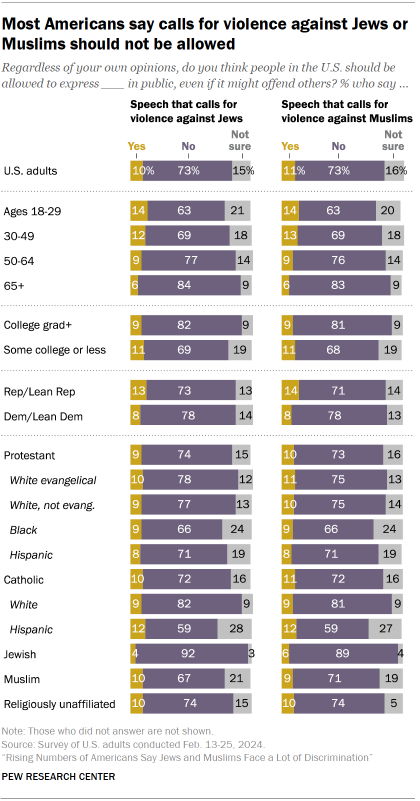
While most Americans favor free expression of opinions about Israeli and Palestinian statehood, most do not think calls for violence should be allowed. Just one-in-ten adults surveyed say that speech advocating violence against either Jews (10%) or Muslims (11%) is permissible.
Across a wide range of demographic groups, solid majorities of Americans feel that speech inciting violence against Jews or Muslims should not be allowed, though there are some differences. For example, U.S. adults under 50 are slightly more likely than older Americans to say that calls for violence against either religious group should be allowed.
Republicans and Republican-leaning independents are also, on average, slightly more likely than Democrats and Democratic leaners to say that public calls for violence against Muslims or Jews should be allowed – though most people in both parties view such speech as impermissible.
As with expressions of support or opposition to statehood, U.S. adults with some college or less education are more likely than those with at least a college degree to say they are unsure whether calls for violence against Jews or Muslims should be allowed.
How attention to the war and sympathy with each side are related to views on free speech
Americans who say they follow news about the Israel-Hamas war extremely or very closely are more likely than those who follow the news less closely to feel that people should be allowed to express speech that supports or opposes Israeli and Palestinian statehood.
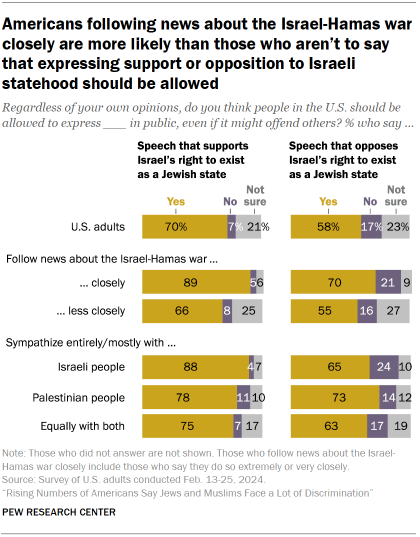
But regardless of how closely they are following news about the war, most U.S. adults say speech advocating for violence against Jews or Muslims should not be permitted. (Though those who follow the news less closely are somewhat more likely to say they are unsure.)
As one might expect, Americans whose sympathies lie mostly or entirely with the Israeli people are especially likely to say that speech supporting Israel’s right to exist as a Jewish state should be allowed (88%). But 78% of Americans whose sympathies lie mostly or entirely with the Palestinian people say the same, as do three-quarters of those who say they sympathize equally with both groups.
Americans who sympathize mostly or entirely with Palestinians are somewhat more likely to say that speech opposing Israel’s right to exist should be allowed (73%). But 65% of those whose sympathies tilt toward Israel also favor allowing such speech, and so do 63% of those who sympathize equally with both.
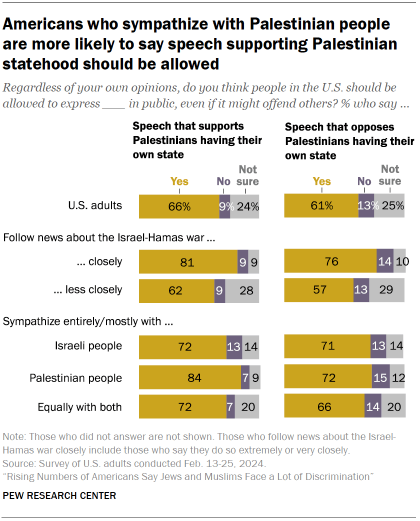
Also, Americans who sympathize mostly or entirely with Palestinians are about as likely as those whose sympathies lie primarily with Israelis to say that speech opposing Palestinian statehood should be allowed: 72% of Palestinian sympathizers take this position, along with 71% of Israeli sympathizers.
Those who sympathize more with the Israeli people are as likely to say speech that calls for violence against Jews should be allowed (11%) as they are to say this for speech calling for violence against Muslims (13%). There is a similar pattern among those who sympathize more with the Palestinian people and those who sympathize equally with both.
Taking personal offense at speech or news about the Israel-Hamas war
One-third of Americans say that, since the start of the Israel-Hamas war, they have personally felt offended because of something they saw on the news or social media about the war. And 17% say they have personally felt offended because of something someone said around them about the war.
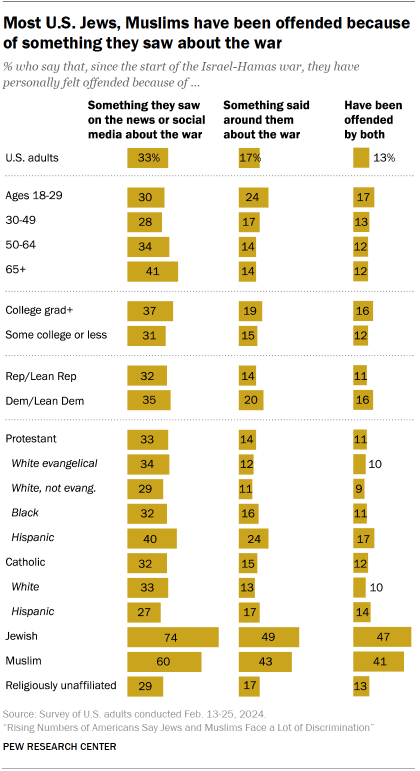
American Jews and Muslims are the only religious or demographic groups analyzed in this report in which a majority say they have felt offended because of something they saw on the news or social media: 74% of Jews and 60% of Muslims have been offended by news or social media related to the Israel-Hamas war.
Jews (49%) and Muslims (43%) are also far more likely than others to say they have felt offended by something someone said around them about the war.
U.S. adults ages 65 and older are more likely than their younger counterparts to say they have felt personally offended by something they saw on the news or social media about the war.
But U.S. adults under 30 are more likely than Americans ages 30 and older to say they have been offended by something someone said around them about the war.
Cutting contact with someone because of what that person said about the Israel-Hamas war

Relatively few Americans (8%) say they have stopped talking to someone in person, or unfollowed or blocked someone online, because of some comment that person made about the Israel-Hamas war.
But American Muslims (27%) and Jews (26%) are more likely than the other religious and demographic groups analyzed to say they have stopped talking to someone because of something that person said about the war.
This is a relatively uncommon experience across most demographic groups, though 16% of American adults under 30 have stopped talking to someone because of comments about the war.


